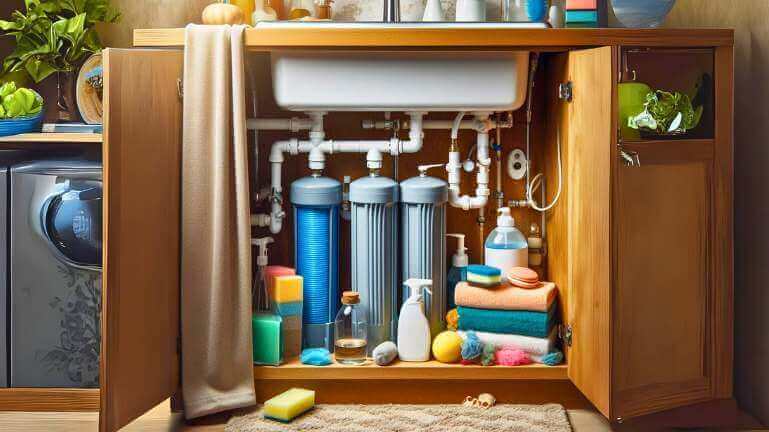Are you tired of dealing with hard water issues like frequent clogs, residue buildup, and poor water quality? Investing in a water softener system could be the solution you’re looking for. But how much does it cost? In this guide, we’ll break down the factors influencing water softener costs and provide you with valuable insights to help you make an informed decision for your home.
Key Takeaways:
- Cost Range: Water softener installation typically costs $1,100 to $3,000.
- Factors Affecting Cost: System type, home size, water hardness, location, and labor fees influence the total expense.
- Types of Systems: Options include ion exchange, salt-free, dual-tank, reverse osmosis, and magnetic systems.
- Determining Size: Calculate based on water usage, hardness level, and household size for optimal efficiency.
- Cost Reduction Strategies: Compare prices, consult professionals, consider smaller systems, and explore rental options.
Water Softener System: Major Cost Factors
The cost of installing a water softener system typically ranges from $1,100 to $3,000. However, several factors can influence this price range. Factors such as system type, home size, location, and labor fees play a significant role in determining the overall cost of installation.
Cost by Type of Water Softener System
Water softener systems come in various types, each with its cost implications. From magnetic systems starting at $200 to reverse osmosis systems costing up to $1,800, the choice of system type can significantly impact your investment. Consider your specific water quality needs and budget when selecting the right type of water softener for your home.
Cost by Home Size
The size of your home and your daily water usage requirements will also affect the cost of installing a water softener system. Larger homes with higher water usage will require larger systems, which can increase installation costs. Calculate your household’s typical water usage to determine the appropriate system size for your needs.
Cost by Capacity
Determining the right system capacity based on your water hardness level is crucial for effective water softening. Your water hardness level, measured in grains per gallon (GPG), will help you calculate the ideal system capacity. Costs for water softener systems increase with higher capacity requirements, so it’s essential to accurately assess your needs.
Geographic Location
Local water conditions can vary significantly, affecting the overall cost of installing a water softener system. Water hardness levels differ from state to state and region to region, with rural areas typically having lower labor and material costs compared to urban areas. Consider your location’s water hardness level when budgeting for your water softener installation.
Labor and Installation Costs
Labor costs for installing a water softener system depend on the type of system, installation complexity, and plumbing configurations. While DIY installations may be suitable for simpler systems, complex installations require professional expertise. Labor costs can range from $50 to $1,300, so it’s essential to factor this into your budget.
Additional Factors Affecting Water Softener System Cost
Beyond the initial installation cost, several additional factors can impact the overall cost of owning a water softener system. These factors include ongoing maintenance, water filter refills, permits, plumbing upgrades, and water testing kits. Consider these factors when budgeting for your water softener investment.
How to Reduce Water Softener System Costs
While investing in a water softener system may require a significant initial investment, there are ways to reduce costs. Choosing the right system size, comparing pricing from multiple suppliers, consulting with professionals, installing smaller systems, or renting a water softener are all viable options to make your investment more cost-effective.
Conclusion
Investing in a water softener system can greatly improve your home life and water quality. By understanding the factors influencing water softener costs and exploring cost-saving strategies, you can make an informed decision that aligns with your budget and needs. Consider consulting with professionals and researching different options to find the best water softener solution for your home.
Frequently Asked Question
How much does a water softener system typically cost?
The cost of a water softener system can vary depending on factors such as the type of system, home size, and geographic location. On average, installation costs range from $1,100 to $3,000.
What factors influence the cost of a water softener system?
Several factors can affect the cost of a water softener system, including the type of system chosen, the size of the home, water hardness levels, geographic location, labor and installation fees, and ongoing maintenance expenses.
What are the different types of water softener systems available?
There are various types of water softener systems, including ion exchange systems, salt-free systems, dual-tank systems, reverse osmosis systems, and magnetic systems. Each type has its advantages, features, and price points.
How can I determine the right size water softener system for my home?
Calculating the appropriate size water softener system involves considering your home’s water usage, water hardness level (measured in grains per gallon), and the number of people in your household. Multiplying the number of occupants by 90 (the average daily water usage per person) and then multiplying by the water hardness level can help determine the ideal system capacity.
Are there any ways to reduce the cost of installing a water softener system?
Yes, there are several strategies for reducing water softener system costs. These include comparing pricing from multiple suppliers, consulting with professionals to assess your home’s needs, installing smaller systems for specific areas like faucets or showers, and exploring rental options for short-term soft water needs. Additionally, choosing a system that matches your home’s water usage and considering DIY installation for simpler systems can also help lower costs.

Ross Walters, an Electrical supplies and Water Appliances specialist, shares his extensive expertise on top platforms. With a focus on empowering professionals and enthusiasts, Ross delivers up-to-date insights and practical advice. His commitment to staying abreast of industry trends establishes him as a trusted source for navigating the complexities of electrical systems and water appliances.

